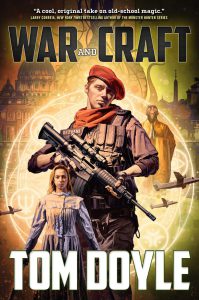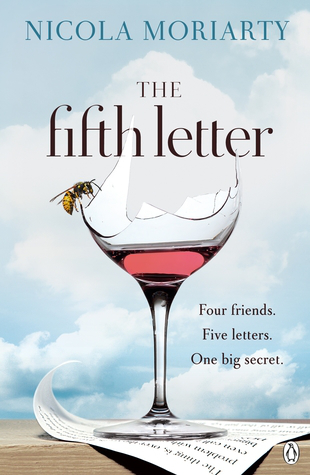
My American Craftsmen trilogy is a saga of magician-soldiers and psychic spies. It has a backstory in which Poe and Hawthorne were writing thinly veiled nonfiction and hidden supernatural forces helped to create the world as we know it today.
Sounds like a fun secret history to write, yes? And for the most part, it was. But I had one repeating difficulty: current events kept running ahead of my imagination.
For example, in War and Craft, the final book in my trilogy, one of my characters notes that “no one in the West seemed to care that, in Russia, that thing from Lubyanka’s subbasement was in charge at the Kremlin.” Earlier, I refer to “that thing” as the “Tsar of Bone.” I wrote this in the winter of 2015-16 as a little poke at Putin in response to Russia’s recent activities in Ukraine and elsewhere. In my fictional secret world, I implied that Putin was the minion of a Lovecraftian variation of Koschei the Deathless or that he was that entity itself.
I never expected that by the time the book was published in 2017, people in the West would have reason to care considerably more about that thing from Lubyanka being in charge, and that my little joke wouldn’t seem as amusing to an American audience.
This wasn’t the first time that events in Russia and Ukraine outpaced my writing. I originally imagined my trilogy happening in a vague near-future timeframe so as not to fall too quickly out of date. While writing the second book of my series (The Left-Hand Way) in 2013, I initially referred to the British monarch as “His Majesty,” anticipating that Queen Elizabeth II could only reign a few more years and that, under either of the most likely scenarios, the new occupant of the throne would be male.
But in November 2013, the protests started in Kiev, eventually leading to a revolution and Russian intervention in 2014. The problem wasn’t that these events contradicted my plot; rather, they fit so well with the Ukrainian portion of my story that I couldn’t ignore them. So, I decided that The Left-Hand Way took place in the fall of 2013, and it was back to “Her Majesty” for the British monarch.
(The Left-Hand Way also has some uncanny anticipations of my cancer diagnosis in 2014, but that’s another story, and in any case I appear to be cured.)
For my trilogy’s secret history, I followed what I call the Tim Powers rule, of which his Declare is an excellent example. My version of the rule is that everything happened where and when the historians say, and the author’s fictional and supernatural elements must fit between and beneath real world events in a sort of conspiracy theory fashion. So, events like the escape of Washington’s army at Brooklyn Heights, the shooting of Stonewall Jackson by his own men, and the weather turning better in time for D-Day have supernatural explanations in my books. This becomes slightly uncanny when I find a past event that seems to fit with my paranoid schizophrenic magpie approach to history, or when (as with Ukraine) current events seem to loosely mirror my writing.
But, though it can be cool when my writing anticipates the real world news, there are plenty of instances where I hope events don’t mirror my books. As my story moves forward, the magical military services and their governments become divided within themselves. Across the globe, the mundane democracies are failing in part due to these hidden stresses. Governments turn hostile to the magician-soldiers, forcing some into exile, imprisoning others, and killing many. Low level clashes are escalating toward civil wars, with wars between major countries not far behind. Precognitives are giving odds on the end of the world.
I sincerely hope that the real world is less apocalyptically minded than my fictional version.
I should add that my use of history isn’t merely a “what if” intellectual exercise; in my work, history is an important component of character. Even in their everyday lives, my protagonists repeatedly feel the weight of history. They remember their ancestors going back for hundreds of years, even talking with their ghosts, and they continue the feuds those ancestors started. The past has helped to form their personalities and informs all their choices. More so than the commonly forgetful mundanes, my craftspeople carry history in their bones.
This is not always a good thing, as in the saying about Ireland’s history: that it’s something the English should remember and the Irish should forget. Two of the feuding families in my trilogy, the Mortons and the Endicotts, have a lot of forgetting to do. But more often for these characters with long historical memories, taking responsibility for the past is an essential part of ending conflict. Unlike my apocalyptic scenarios, this is something I would like to see more of in the real world. Thanks to Strange Currencies for inviting me here!
Tom Doyle is the author of a contemporary fantasy trilogy from Tor Books. In the first book, American Craftsmen, two modern magician-soldiers fight their way through the legacies of Poe and Hawthorne as they attempt to destroy an undying evil– and not kill each other first. In the sequel, The Left-Hand Way, the craftsmen are hunters and hunted in a global race to save humanity from a new occult threat out of America’s past. In the third book, War and Craft (Sept. 2017), it’s Armageddon in Shangri-La, and the end of the world as we know it. Some of Tom’s award-winning short fiction is collected in The Wizard of Macatawa and Other Stories. He has survived Harvard, Stanford, and cancer, and he writes in a spooky turret in Washington, DC. You can find the text and audio of many of his stories on his website: http://www.tomdoyleauthor.com.
***
You can read my reviews of two of Tom Doyle’s works here:
War and Craft
The Left-Hand Way





